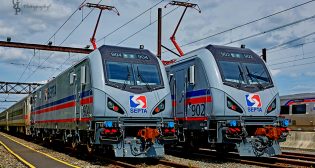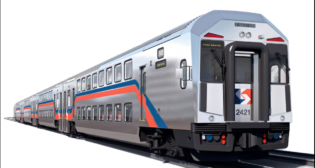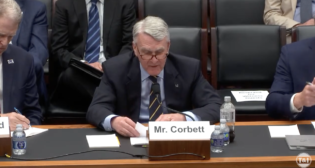
Transit Briefs: BART, LIRR, MBTA
Written by Marybeth Luczak, Executive Editor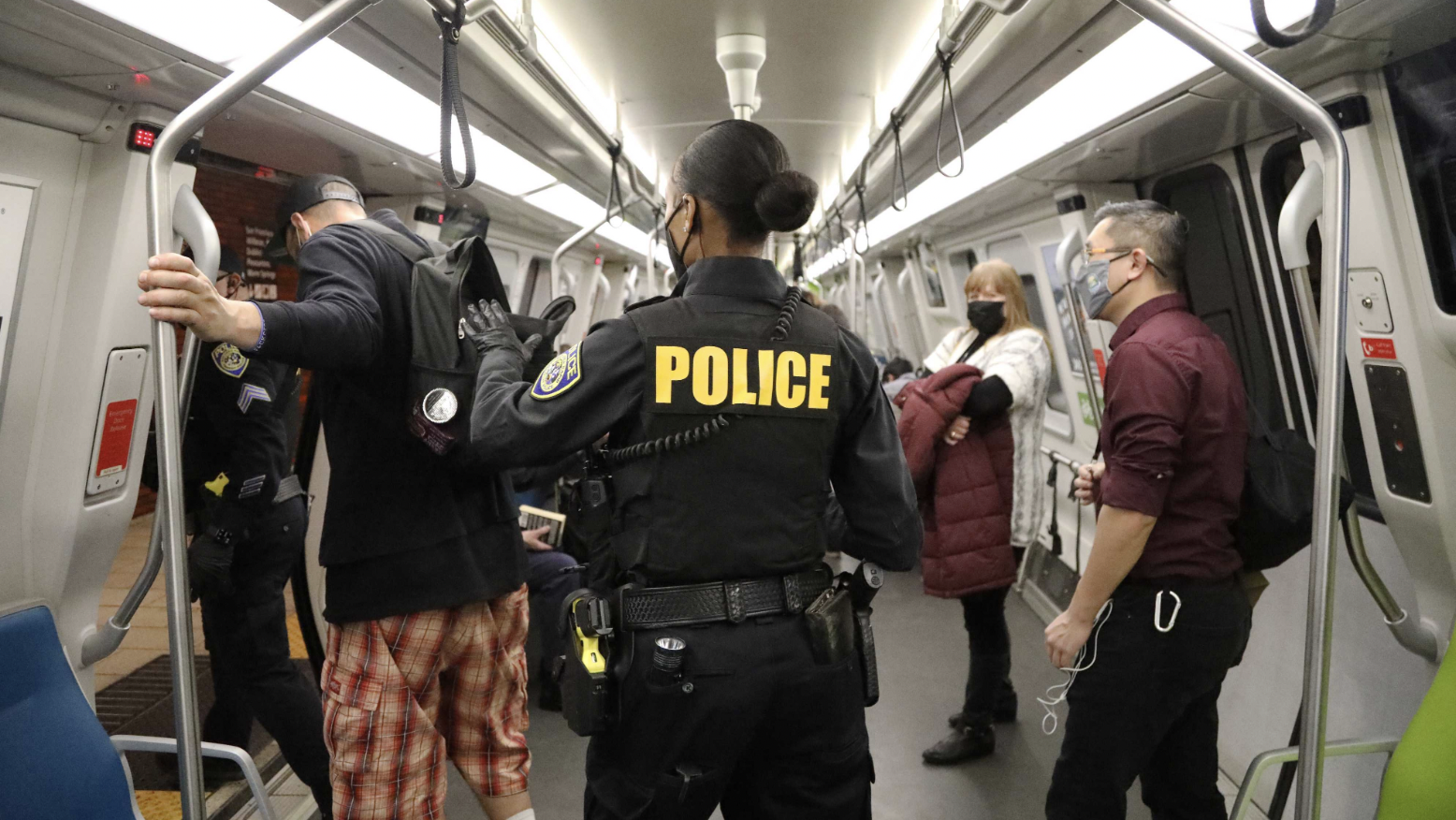
BART will increase police patrols on trains and in stations, increase the frequency of “deep cleaning” of train cars and add more “scrub crew” cleaning at stations this spring. (BART Photograph)
San Francisco Bay Area Rapid Transit (BART) is boosting police presence and cleaning in response to rider concerns. Also, New York Metropolitan Transportation Authority (MTA) and federal, state and local officials celebrate the start of full-scale Long Island Rail Road (LIRR) service to Grand Central Madison; and Massachusetts Bay Transportation Authority (MBTA) launches a safety dashboard for riders and pushes back implementation of its new automated fare collection system.
BART on Feb. 24 reported that it will boost police patrols on trains and in stations, increase the frequency of railcar cleaning, and add more “scrub crew” cleaning at stations this spring. BART Police will more than double the presence of sworn officers in trains beginning March 20 to address riders’ “safety concerns and quality of life issues during operating hours,” according to the agency.
BART police will remove seven traditional vehicle patrols per shift and move those officers onto trains. Also, all officers currently on special assignment, such as the K9 unit, will shift to train patrols as BART recruits more officers, the agency said. An additional eight to 18 officers will patrol trains per shift, joining the 10 officers already out in the system dedicated to San Francisco and the core service area of BART.
The redeployment of sworn officers adds to the visible presence provided by BART’s unarmed safety staff, including Ambassadors, Crisis Intervention Specialists and Fare Inspectors on trains.
“This is the biggest train deployment we’ve had in the 25 years I’ve been here, if not the history of the BART Police Department,” BART Police Chief Ed Alvarez said.
Also, BART reported that it is now “thoroughly cleaning the interior of all cars twice as often as in the recent past.” Eight teams of car cleaners scrub cars during overnight storage at sites throughout the system; this work is in addition to the “quick-clean” crews that sweep through trains at the end of the line during service hours.
As well, the agency said it will send more “deep clean” teams through heavily used stations across the system; work includes pressure washing stairwells and busy areas of stations. BART expects to add four more deep clean teams in the next few weeks, representing a 66% increase in the number of crews dedicated to scrubbing stations.
“The more deep cleaning we can do of stations, hopefully the less emergency cleaning situations we will have in the day shift or at the beginning of service,” BART Assistant General Manager for Operations Shane Edwards said.
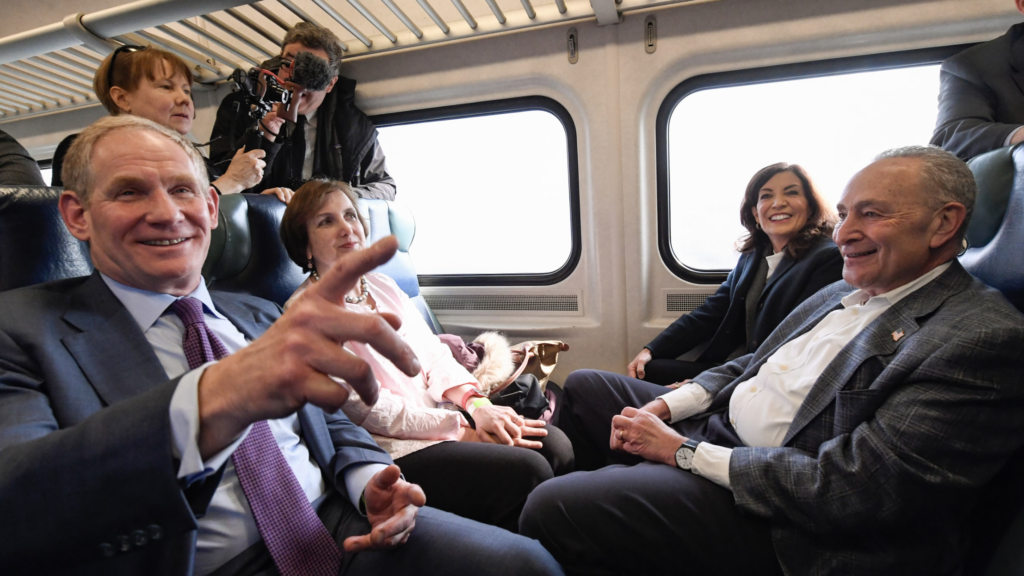
MTA Chair and CEO Janno Lieber, New York Gov. Kathy Hochel, U.S. Senate Majority Leader Charles Schumer, and other federal and local officials on Feb. 26 celebrated the official opening of Grand Central Madison ahead of full-scale LIRR service starting Feb. 27.
The new schedules boost service levels by 41%, adding 271 LIRR trains per day and increasing LIRR systemwide service to 936 trains per day, of which 296 will be to or from Grand Central Madison. They also offer direct access to Midtown east; provide more frequent, reliable service, including in Queens and Brooklyn; and offer reverse-peak service on the Port Jefferson and Ronkonkoma branches, according to the agency.
Limited shuttle service was previously running between Jamaica, N.Y., and Grand Central Madison, which on Jan. 25 opened more than 100 feet below Grand Central Terminal, bringing LIRR trains to the East Side of Manhattan for the first time.
Riders can now transfer directly between LIRR and Metro-North Railroad. MTA has introduced the Combo Ticket, a single ticket for travel between Long Island, Manhattan’s northern suburbs and Connecticut all with one fare.
“LIRR is thrilled to be offering more frequent service and more flexibility to our customers,” LIRR interim President and Metro-North Railroad President Catherine Rinaldi said. “Grand Central Madison also provides connectivity between LIRR and Metro-North for the very first time, opening up a new era of regional rail travel for customers of both railroads.”
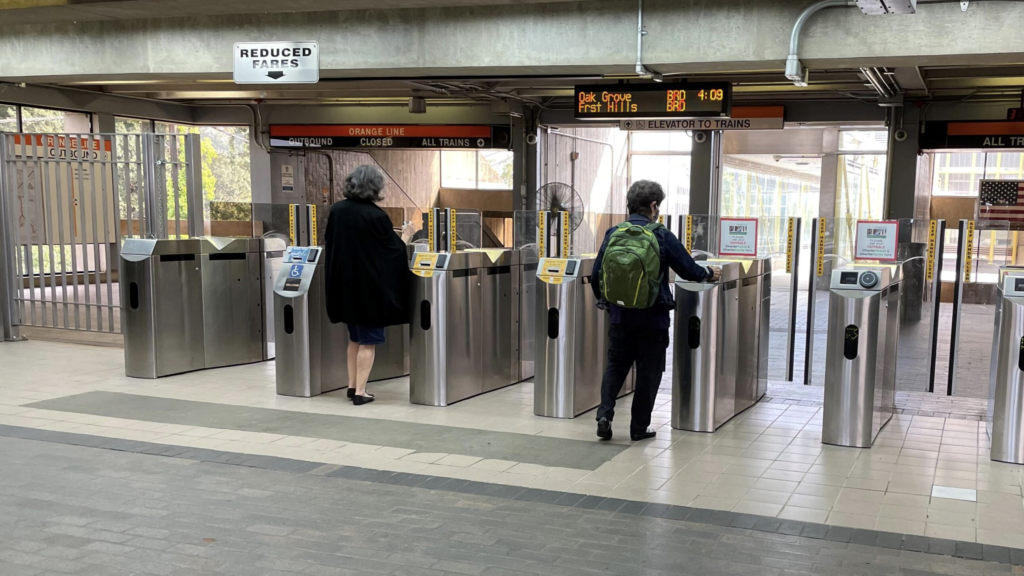
MBTA on Feb. 24 debuted an online safety dashboard that “allows the public to see the status of the T’s progress in responding to the Federal Transit Administration’s (FTA) Safety Management Inspection (SMI) Special Directives,” according to the Authority.
The report covered all rail transit and safety disciplines and included a review of rail transit operations, training, vehicle maintenance, signals, train control and track access. It also covered capital project delivery, traction power, facilities and safety management. The FTA required MBTA and DPU to submit Corrective Action Plans in response to each of the Special Directives.
MBTA’s dashboard includes a description of each Corrective Action Plan, what it is intended to correct, the MBTA’s analysis, recommendations, and the status of steps being taken to address the FTA’s Special Directives. The dashboard also includes a Speed Restriction Report that will be the basis for a new Speed Restriction dashboard that MBTA will launch next month.
MBTA reported that it has developed 38 Corrective Action Plans and 545 Action Items that explain how the Authority will address each FTA Special Directive and implement safety improvements across the organization; 36% of its overall action items have been completed.
“The dashboard will be updated monthly, and new features added as the T progresses toward addressing each Special Directive,” MBTA interim General Manager Jeffrey Gonneville said. “This work will support safety as a core value by communicating and building the infrastructure and organizational framework that will allow us to move forward.”
Further Reading:
Second FTA Safety Probe Targets MBTA
FTA Issues Safety Directives to MBTA
FTA to MBTA: Additional Safety Changes Needed
How MBTA Coped During Partial Shutdowns
Separately, the Boston Herald on Feb. 26 reported that MBTA won’t roll out its $935 million automated fare collection system in 2024, as planned. The project, already three years behind schedule, will replace the 2006 CharlieCard system with a contactless system, “allowing riders to tap or board at any door with a fare card, smartphone or credit card, with an additional aim of cutting down on fare evasion,” according to the newspaper.
In October, electronic fare gates opened at North Station; they are slated to be installed in the future at South and Back Bay stations, the newspaper reported.
“The Healey-Driscoll administration has undergone a preliminary review of this complex project to assess its current status and timeline for completion,” MBTA spokesperson Joe Pesaturo told the Herald on Feb. 25. “Based on the review so far, it’s clear based on the contractor’s most recent schedule, it is unlikely to meet the current 2024 timeline for full implementation. As the review process advances, more information will become available.”
The original contract, valued at $723.3 million, called for a 2021 start-date, “but the T’s Fiscal and Management Control Board amended the deal in April 2020, pushing that timeline to 2024 and driving up the final price tag to $935.4 million,” according to the newspaper.
The Boston Herald reported that “Brian Kane, executive director of the MBTA Advisory Board, said the board has been asking for a project update as part of its capital budget oversight process for the past couple of years, but has not been getting much of a response from the T.
“‘It looks like they’re trying to do this incrementally and not make a big deal about it, and have this be a whole big, giant program or project that’s subject to systemic failure issues,’ Kane said. ‘I think they’re going to incrementally phase in stuff over the next three, four or five years. And by 2026, ‘27, ‘28, you will see a wholly transformed fare collection system out there. But you won’t have a giant ribbon cutting.’”
